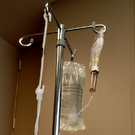Articles tagged with: Decadron
News»

A recent Greek study looks at the efficacy and safety of Revlimid plus dexamethasone for relapsed and refractory multiple myeloma patients in ‘the real world’ -- that is, in patients being treated in standard clinical practice rather than clinical trials.
The study's findings confirm that Revlimid (lenalidomide) plus dexamethasone (Decadron) is effective and safe in day-to-day use among relapsed myeloma patients.
The majority of the patients in the study (77 percent) responded to treatment with Revlimid and dexamethasone, with 20 percent achieving a complete response. According to the investigators, these …
News»

A new study provides useful, if somewhat dated, insight into the efficacy and safety of Velcade combined with dexamethasone to treat relapsed or refractory multiple myeloma.
The retrospective study, which was carried out using data from a single center in Italy, included patients who had a median of two previous therapies.
In these patients, the combination of Velcade (bortezomib) and dexamethasone (Decadron) had an overall response rate of 55 percent, and a complete response rate of 19 percent. Median overall survival from the start of treatment was 22 months. …
NewsFlash »
Velcade Receives Additional Approvals In Europe – The approved uses of Velcade (bortezomib) for multiple myeloma patients were recently expanded in the European Union. These additional approved uses include treatment of newly diagnosed transplant-eligible myeloma patients with Velcade plus dexamethasone (Decadron) or Velcade plus thalidomide (Thalomid) and dexamethasone, as well as retreatment of relapsed myeloma patients with Velcade for those who responded to prior Velcade therapy. Previously, Velcade was approved in combination with melphalan (Alkeran) and prednisone for the treatment of newly diagnosed myeloma patients who are ineligible for stem cell transplantation, or as a single agent for the treatment of relapsed myeloma patients with one prior therapy who have had a transplant or are ineligible for a transplant. For more information, please see the August 8 and June 28 Johnson & Johnson press releases about the new approvals for newly diagnosed and relapsed myeloma patients.
Pilot Clinical Trial To Test Whether Anti-Depressant Desipramine Assists With Stem Cell Mobilization – Researchers from the Albert Einstein College of Medicine in New York City have launched a clinical trial that will determine how well the antidepressant desipramine (Norpramin, Pertofrane) in combination with Neupogen (filgrastim), which is a type of granulocyte colony-stimulating factor (G-CSF), works to mobilize stem cells in multiple myeloma patients undergoing stem cell transplantation. A previous study in mice showed that desipramine plus G-CSF mobilized more stem cells than G-CSF alone. For more information about the study or how to enroll, see the clinical trial description.
Clinical Trial To Study Modified Version Of Melphalan Plus Dexamethasone For Relapsed / Refractory Myeloma – A new Phase 1/2 clinical trial is testing the efficacy and safety of a modified version of melphalan in combination with dexamethasone for relapsed and refractory myeloma patients. The modified version of melphalan, known as melphalan-flufenamide or melflufen, is being developed by the Swedish pharmaceutical company Oncopeptides and consists of melphalan bound to flufenamide. The drug only becomes active once it enters a cell and melphalan is released from flufenamide. Cancer cells more efficiently activate the drug, increasing the concentration of melphalan in cancer cells compared to healthy cells. The study is sponsored by Oncopeptides and is being conducted in the United States and Europe. For more information about the study or how to enroll, see the clinical trial description and related Oncopeptides press release.
News»

Results from a Spanish Phase 3 study published late Wednesday in the New England Journal of Medicine indicate that treatment of high-risk smoldering multiple myeloma with Revlimid plus dexamethasone delays progression to symptomatic multiple myeloma and extends overall survival.
In addition, the Revlimid (lenalidomide)-dexamethasone (Decadron) regimen had an acceptable safety profile, according to the investigators.
Despite these findings – which would tend to support active treatment of high-risk smoldering myeloma – myeloma experts believe it is too early to begin treating all high-risk smoldering myeloma patients with anti-myeloma therapies.
Dr. María-Victoria …
News»

Results from a small Phase 2 study conducted throughout Japan suggest that a combination of Velcade, doxorubicin, and intermediate-dose dexamethasone is effective in patients with relapsed or refractory multiple myeloma.
Most patients (89 percent) responded to treatment, with a third of them achieving a complete or near complete response. In addition, the median progression-free survival was 12.1 months.
According to the Japanese researchers, the findings from this study are comparable to those from previous studies that examined the effectiveness of the Velcade (bortezomib), doxorubicin (Adriamycin), and
NewsFlash »
Velcade-Thalidomide-Dexamethasone Combination May Be Effective After A Stem Cell Transplant In Multiple Myeloma Patients – Results from a French study show that the combination of Velcade (bortezomib), thalidomide (Thalomid), and dexamethasone (Decadron), commonly referred to as VTD, may improve response rates in multiple myeloma patients after stem cell transplantation. The complete response rate for patients who received VTD as a consolidation therapy (52 percent) was significantly higher than the rate for patients who received a placebo (30 percent). The time to progression was also longer in patients who received VTD (62 percent), compared to those who received a placebo (29 percent). All patients had also received VTD as induction therapy prior to stem cell transplantation. For more information, please refer to the letter in the journal Leukemia (abstract).
Revlimid May Not Worsen Pre-Existing Peripheral Neuropathy In Relapsed Or Refractory Myeloma Patients – Results from an Italian study indicate that Revlimid (lenalidomide) does not worsen pre-existing peripheral neuropathy (pain, tingling, and loss of sensation in the extremities due to nerve damage) in relapsed and refractory multiple myeloma patients. The investigators administered Revlimid and dexamethasone to 30 patients who had previously received Velcade or thalidomide. After 12 months of Revlimid therapy, peripheral neuropathy did not worsen in patients with pre-existing peripheral neuropathy and did not develop in any of the patients without pre-existing neuropathy. Based on these results, the investigators recommend longer follow-up studies to confirm Revlimid’s safety in patients with pre-existing peripheral neuropathy. For more information, please see the study in the Journal of the Peripheral Nervous System (abstract).
Heavy/Light Chain Assay May More Effectively Measure M-Protein Levels In Myeloma Patients – Findings from a European study indicate that the heavy/light chain (HLC) assay can be used as an effective prognostic test in patients with multiple myeloma. The investigators found that the HLC assay was better at identifying monoclonal (M) protein levels than other conventional tests, such as serum protein electrophoresis and immunofixation electrophoresis. In addition, the investigators found that the HLC assay was not only more accurate, but could also detect subtle changes in patients with very low M-protein levels. The investigators note that results from the HLC assay and the free light chain (FLC) assay were generally in agreement, but both tests are needed to exclude the presence of residual disease. For more information, please refer to the study in Leukemia (subscription required).
News»

Results from a Phase 1b clinical trial indicate that Kyprolis in combination with Revlimid and low-dose dexamethasone is effective and safe for relapsed multiple myeloma patients.
Moreover, at the higher doses of Kyprolis and Revlimid tested during the trial, a greater share of patients responded to treatment than was the case in a trial testing Revlimid, Velcade, and dexamethasone in a similar patient population.
In addition, noticeably fewer cases of peripheral neuropathy – that is, pain, tingling, or loss of sensation in the extremities – were observed in the current study in …
